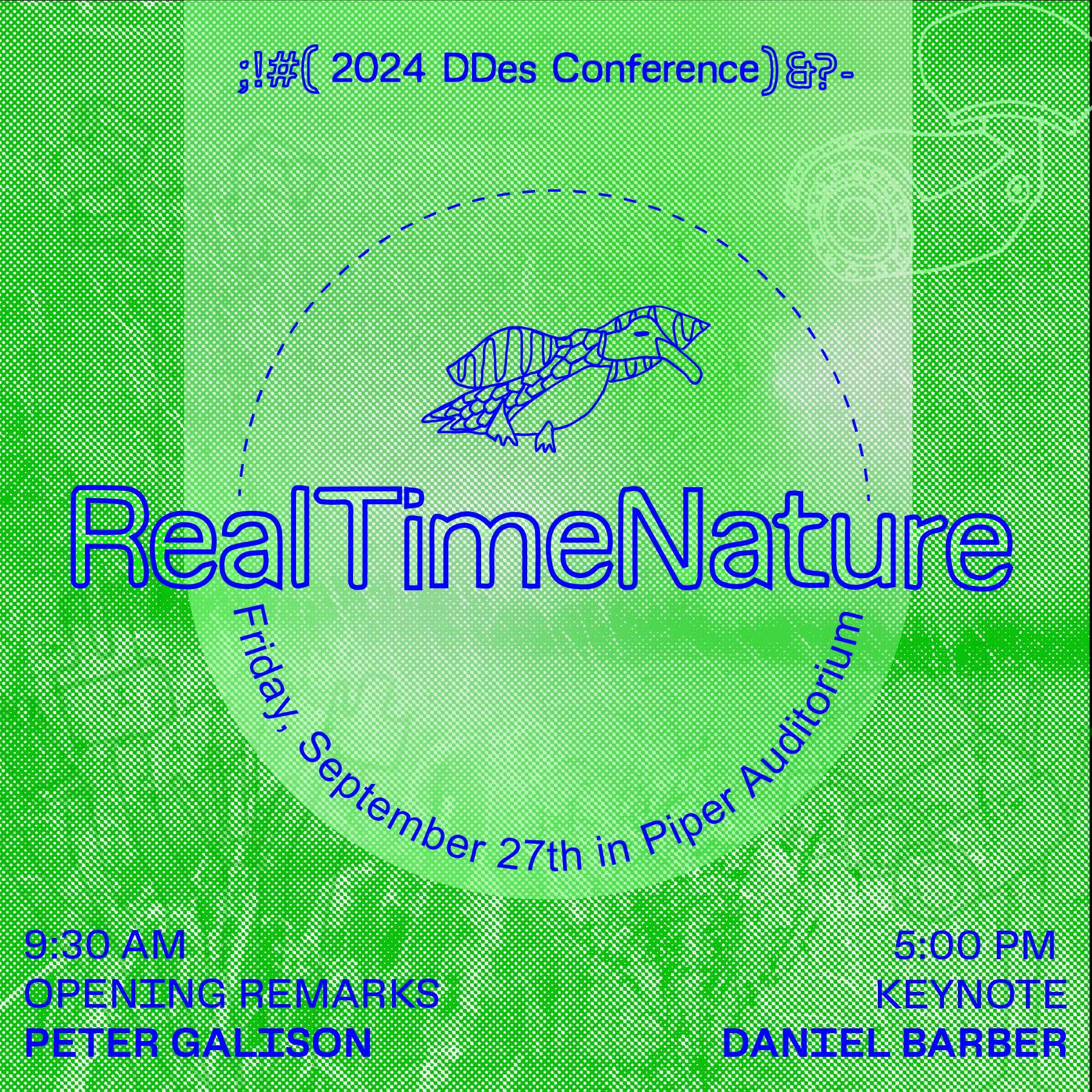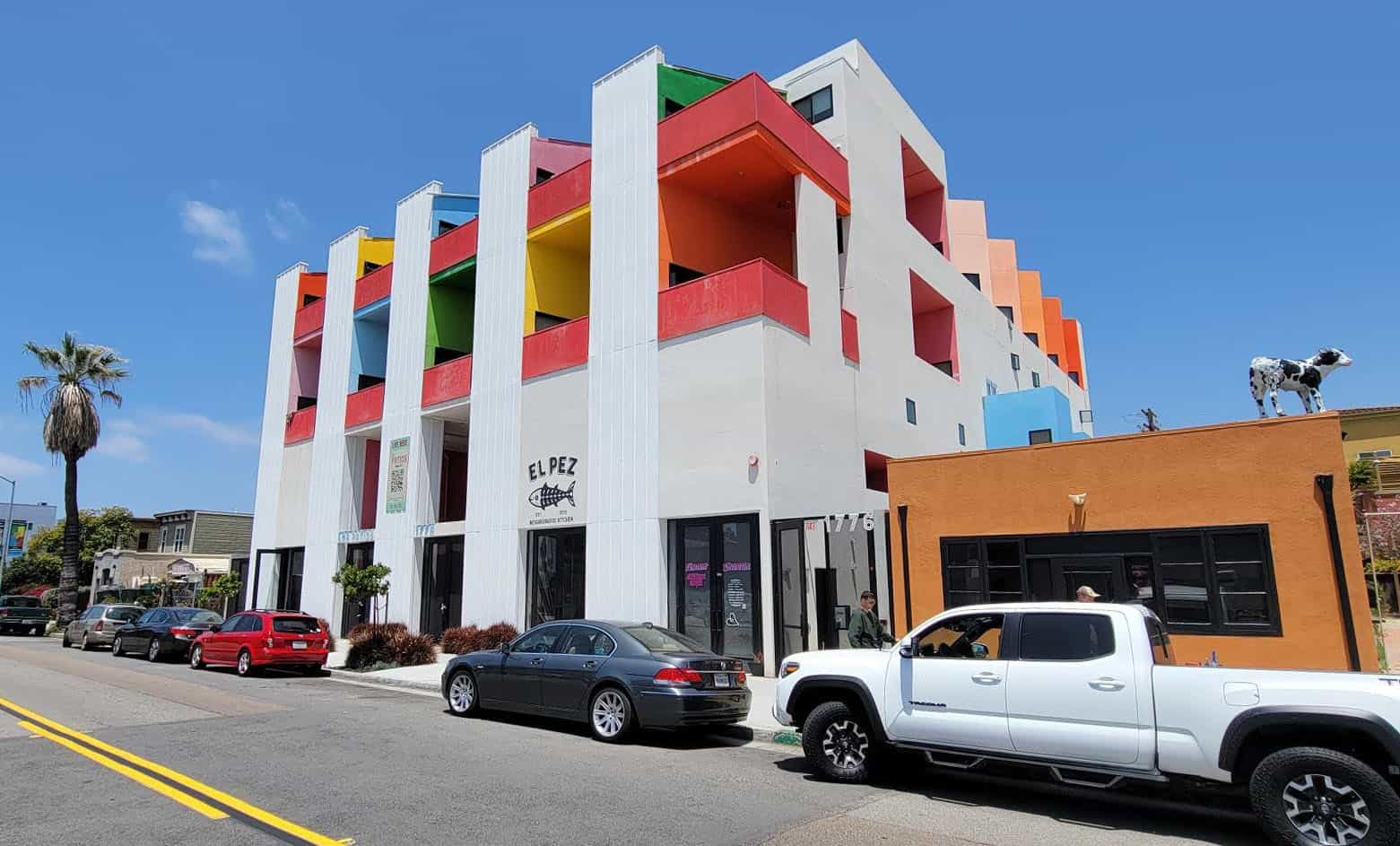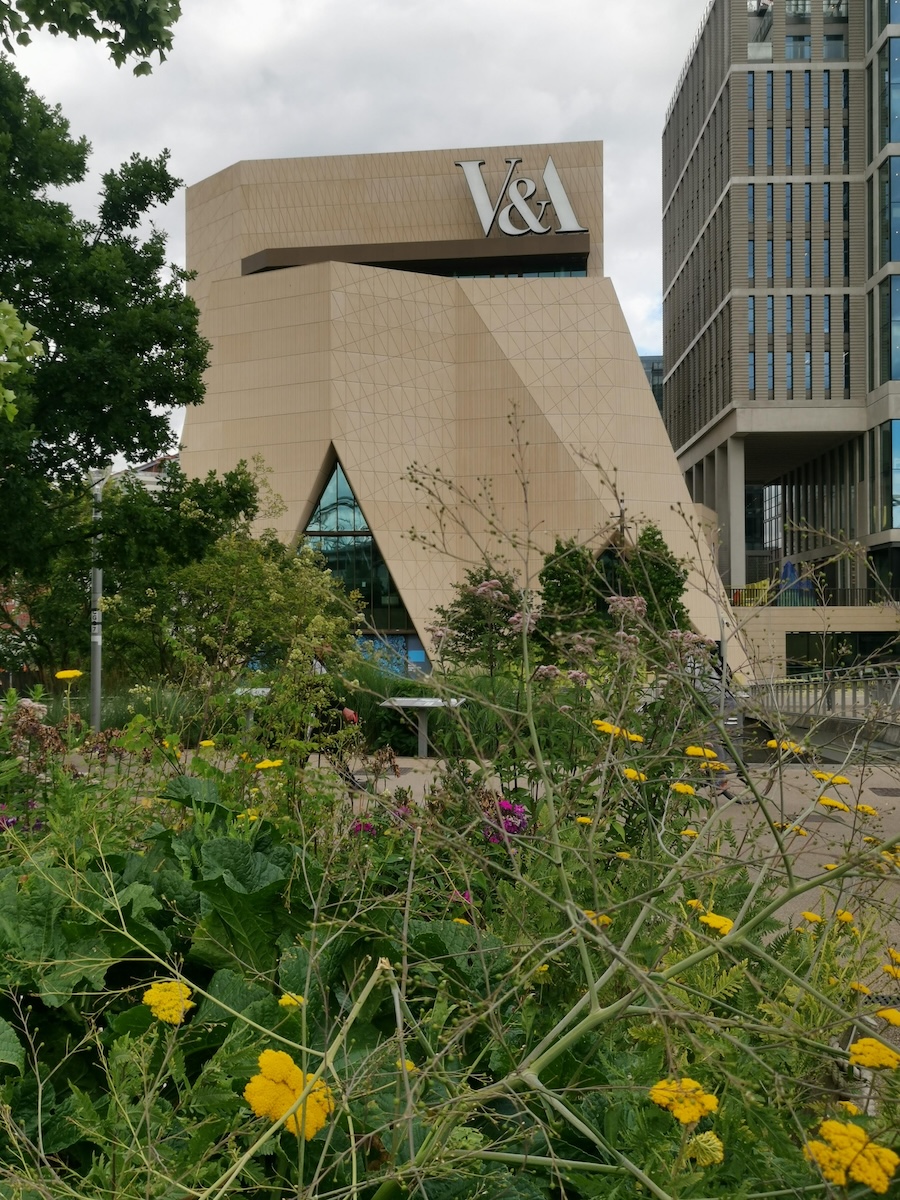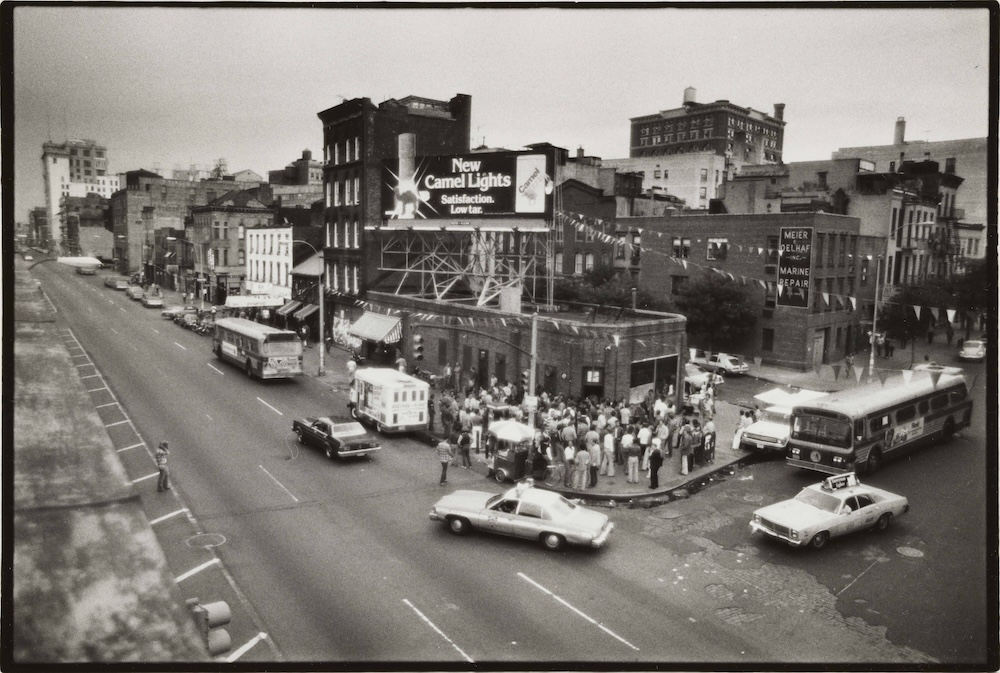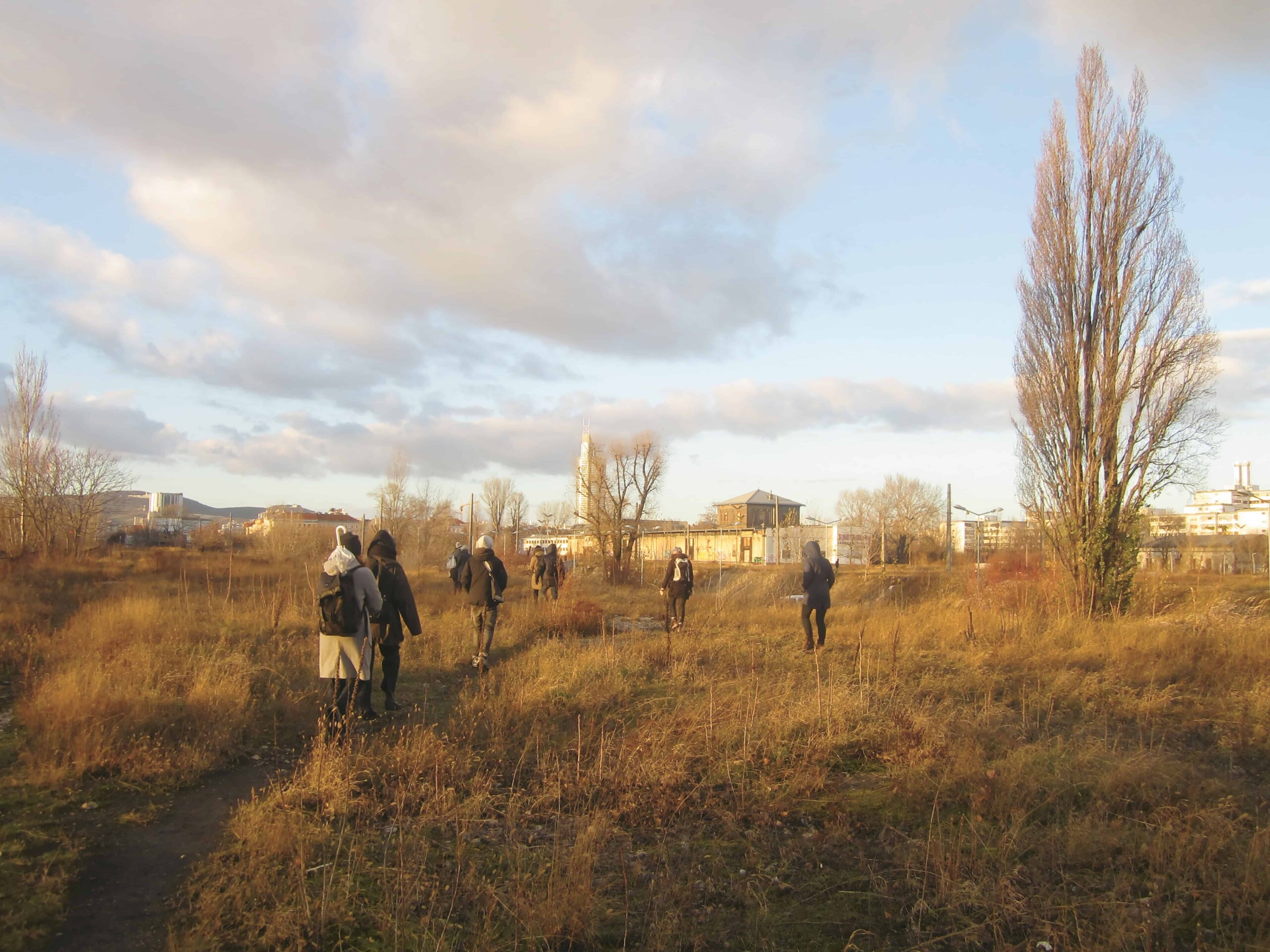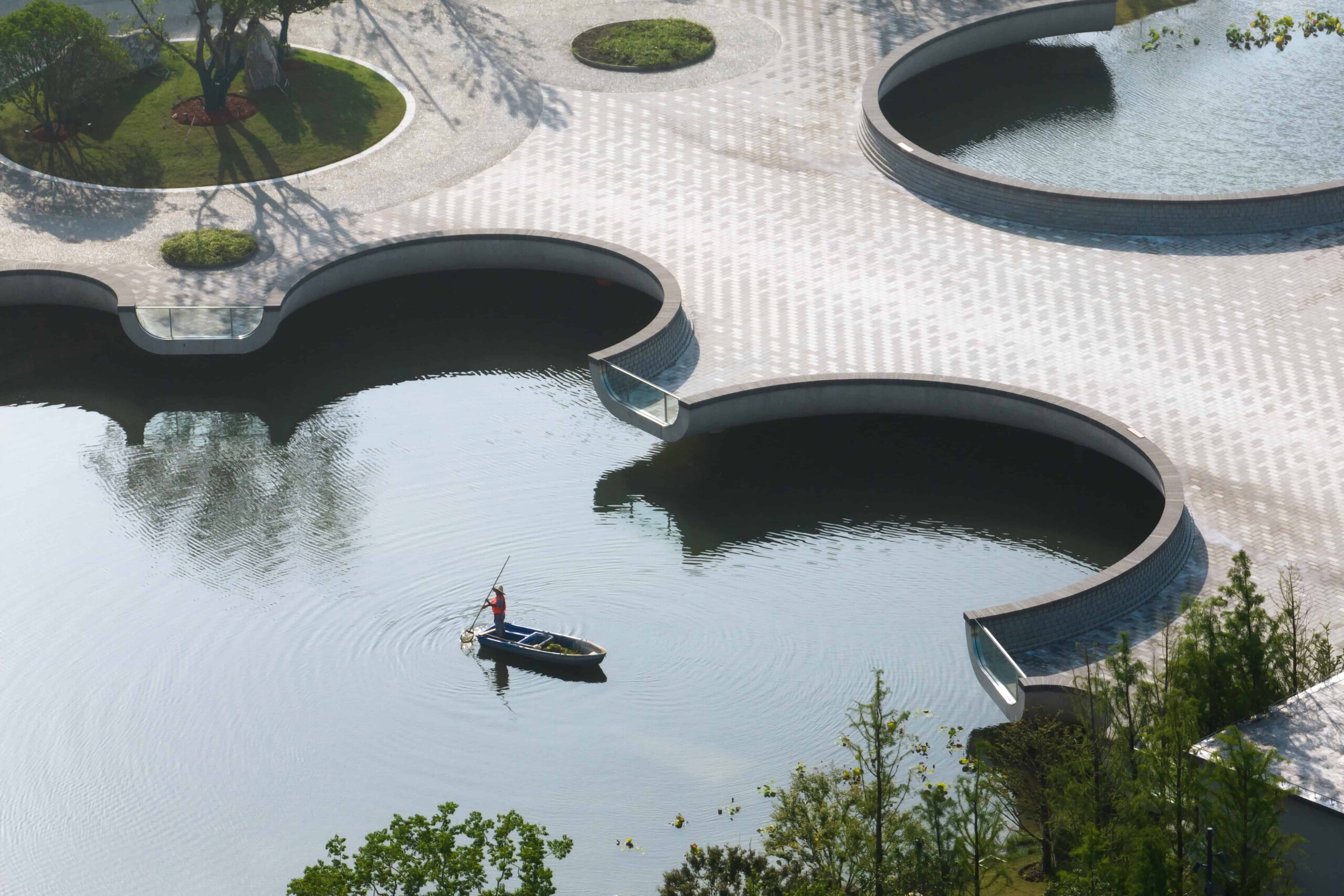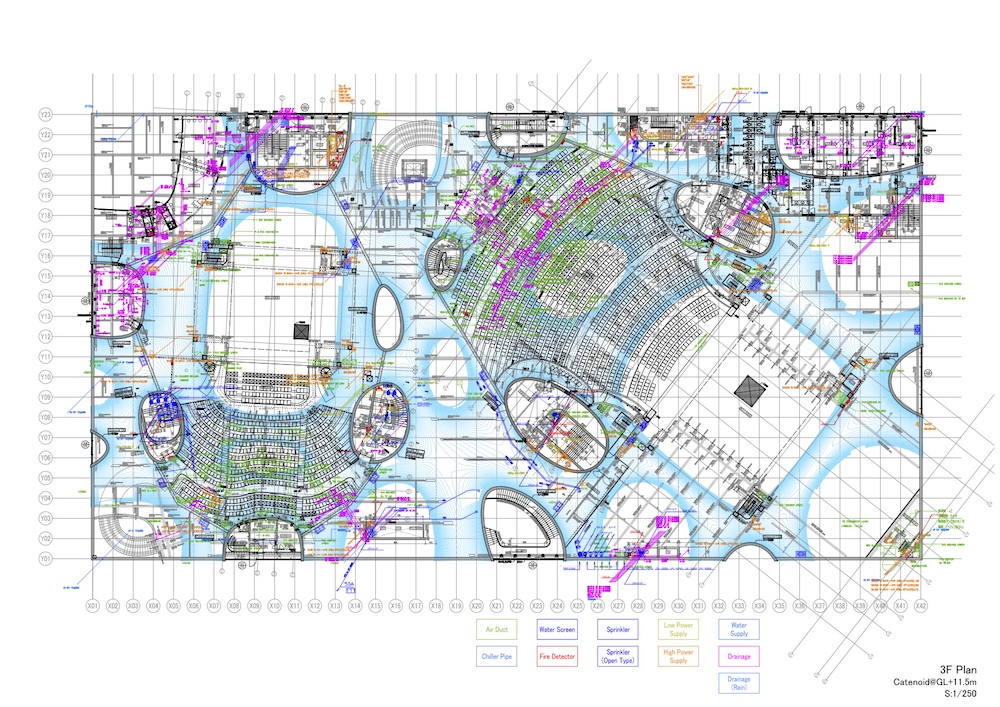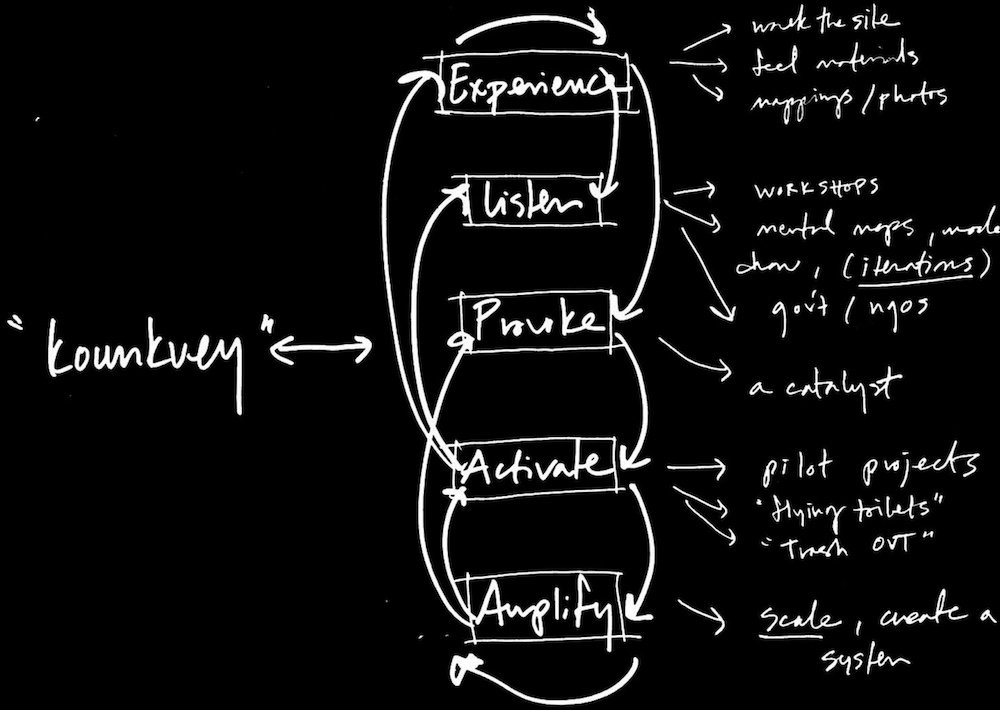DDes Conference 2024: RealTimeNature
Event Description
The earliest duck decoys, found in Ancient Egypt, were often live herons bound to ships, their presence tempting wild waterfowl to killing distance. Birds today are suspicious of their lifeless decoy counterparts, so modern versions have begun to use sensors to mimic natural movement, blurring the artificial and real. If sensors in a decoy help it mimic kin, in turn luring an animal to its death, what might it mean for an environment to use sensors in an attempt to mimic its “natural” state?
RealTimeNature brings together a diverse group of thinkers to discuss the promises and perils of environmental simulation, remote sensing, and real-time synchronizations. In the context of the current “ontological turn,” which responds to the ecological crisis resulting from modernity, RealTimeNature takes into account the philosopher Yuk Hui’s observation that the focus on nature and the non-human in this movement often overlooks questions related to technology.
Through a set of public dialogs and keynote lectures, RealTimeNature poses these questions: What happens when we consider technology as a universal fix, and how does this impact our understanding of space and time? Can we reimagine technology not as a universal concept, but as a diverse multitude?
Schedule
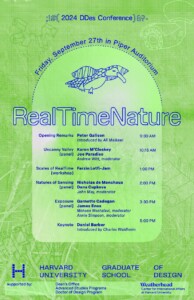
Friday, September 27, 2024 in Piper Auditorium, Gund Hall
Opening Remarks, Peter Galison
Introduced by Ali Malkawi
9:30 AM
Uncanny Valley (Panel), Karen M’Closkey, Joe Paradiso
Andrew Witt, moderator
10:15 AM
Scales of RealTime (Workshop), Farzin Lofti-Jam
1:00 PM
Natures of Sensing (Panel), Nicholas de Monchaux, Dana Cupkova
John May, moderator
2:00 PM
Exposure (Panel), Garnette Cadogan, James Enos
Mohsen Mostafavi and Annie Simpson, moderators
3:30 PM
Keynote, Daniel Barber
Introduced by Charles Waldheim
5:00 PM
Speakers
Peter Galison is the Joseph Pellegrino University Professor at Harvard University. He currently directs the Black Hole Initiative at Harvard, a leading center for interdisciplinary research on black holes. His books include How Experiments End; Image and Logic: A Material Culture of Microphysics; Einstein’s Clocks, Poincaré’s Maps; and, with Lorraine Daston, Objectivity. Peter Galison’s work in writing and film explores the complex interaction between the three principal subcultures of physics–experimentation, instrumentation, and theory—and the embedding of physics in the wider world.
Ali Malkawi is Director of the Doctor of Design Studies Program and Professor of Architectural Technology at the GSD. Malkawi is an international scholar and expert in building simulation, energy conservation, and sustainability in buildings. He teaches architectural technology and computation and conducts research in the areas of computational simulation, building performance evaluation, and design decision support. He is also the founding director of the Harvard Center for Green Buildings and Cities (CGBC).
Karen M’Closkey is associate professor of landscape architecture at the University of Pennsylvania Weitzman School of Design and co-founder, with Keith VanDerSys, of PEG office of landscape + architecture. Their work focuses on the opportunities and limitations enabled by recent advancements in digital mapping and modeling and how they shape our understanding of landscapes and environments. Karen was the recipient of the 2012-2013 American Academy in Rome Prize in landscape architecture. She leads the the EMLab working group with Sean Burkholder and Keith VanDerSys and the Biodiversity working group with Richard Weller.
Joseph Paradiso is the Alexander W. Dreyfoos (1954) Professor at MIT’s Program in Media Arts and Sciences. He directs the MIT Media Lab’s Responsive Environments Group, which explores how sensor networks augment and mediate human experience, interaction and perception. His current research interests include wireless sensing systems, wearable and body sensor networks, sensor systems for built and natural environments, energy harvesting and power management for embedded sensors, ubiquitous/pervasive computing and the Internet of Things, human-computer interfaces, space-based systems, and interactive music/media.
Andrew Witt is an Associate Professor in Practice of Architecture at the Harvard University Graduate School of Design, teaching and researching on the relationship of geometry and machines to perception, design, assembly, and culture. He is also co-founder, with Tobias Nolte, of Certain Measures, a design and technology studio that prototypes the future. Trained in both architecture and mathematics, Witt has a particular interest in a technically synthetic and logically rigorous approach to form.
Farzin Lotfi-Jam is an architect whose work explores the politics of technology and cities. He is an assistant professor in architecture at Cornell University where he directs the Realtime Urbanism Lab. The lab uses and invents new spatial media and technologies to visualize and simulate how algorithms, models, and notions of ”real time” govern urban life. He is also director of Farzin Farzin, an interdisciplinary design studio working across architecture, urbanism, computation, and media. From modeling the control matrices of smart cities to spatializing the cultural logics of social media, his individual and collaborative projects are research based and multimediatic.
Nicholas de Monchaux is Professor and Head of Architecture at MIT. Until 2020 he was Professor of Architecture and Urban Design, and Craigslist Distinguished Chair in New Media at UC Berkeley, where he also served as Director of the Berkeley Center for New Media. De Monchaux is the author of Spacesuit: Fashioning Apollo (MIT Press, 2011), an architectural and urban history of the Apollo Spacesuit, winner of the Eugene Emme award from the American Astronautical Society and shortlisted for the Art Book Prize, as well as Local Code: 3,659 Proposals about Data, Design, and the Nature of Cities (Princeton Architectural Press, 2016). His work has been supported by the MacDowell Colony, the Santa Fe Institute, the Smithsonian Institution, the Hellman Fund, and the Bakar Fellows Program. He is a Fellow of the American Academy in Rome.
Dana Čupková is a Professor at Carnegie Mellon University’s School of Architecture and the graduate Track Chair for the Master of Science in Sustainable Design (MSSD) program. She directs EPIPHYTE Lab, a design and research collaborative that was recognized as the Next Progressives design practice by Architect Magazine in 2018. She is a recipient of the 2019 ACADIA Teaching Award of Excellence, the 2022 ACSA Creative Achievement, and a 2022-23 Fulbright US Scholar. Additionally, she is a member of the Editorial Board of the International Journal of Architectural Computing (IJAC).
John May is founding partner, with Zeina Koreitem, of MILLIØNS, a Los Angeles-based design practice. Their recent work includes completed and ongoing projects in California, New York, Boston, Germany and Beirut. Recently selected as the winner of an international competition to reimagine the west wing of I.M. Pei’s Everson Musum, in Syracuse, NY, MILLIØNS’ experimental work has been featured in solo and group exhibitions at Friedman Benda Gallery, the Storefront for Art and Architecture, The Architecture + Design Museum of Los Angeles, and Jai & Jai Los Angeles, among others. Their essays have appeared in Harvard Design Magazine, e-flux, Flaunt magazine, I.D., a+t, and in a catalog of their work on experimental collective living, New Massings for New Masses: Collectivity After Orthography (MIT, 2015).
Garnette Cadogan is the Tunney Lee Distinguished Lecturer in Urbanism at the School of Architecture and Planning at MIT. His research explores the promise and perils of urban life, the vitality and inequality of cities, and the challenges of pluralism.
James A. Enos is an Assistant Professor of Art and Chair of Studio Core at the University of Georgia. His research engages issues of process, architecture, and social artist practice in an effort to understand how public culture responds to change. He received a BS from Purdue University, a M. Arch from The NewSchool of Architecture, and an MFA from the University of California, San Diego. Enos is a recipient of the 2013 San Diego Art Prize, and has served as artist, director, and founder for several public projects including The Periscope Project, Drone Readymade, Exploring Engagement, Port Journeys, HyperCultural Passengers, WeTrees and Social Logistics.
Mohsen Mostafavi, architect and educator, is the Alexander and Victoria Wiley Professor of Design and Harvard University Distinguished Service Professor, and served as Dean of the GSD from 2008-2019. His work focuses on modes and processes of urbanization and on the interface between technology and aesthetics.
Annie Simpson works via sight-/site-based investigation to make videos, photographs, and essays. For the 2024-2025 academic year, she is a Doctoral Fellow with the Harvard-Mellon Urban Initiative.
Daniel Barber is Professor and Chair of Architecture Theory and History at TU Eindhoven. He is an architectural historian researching the relationship between the design fields and the emergence of global environmental culture across the 20th century. Daniel received a PhD in Architecture History and Theory from Columbia University, and a Master of Environmental Design from Yale University. He currently holds a Fellowship for Advanced Researchers from the Alexander von Humboldt Foundation, which he is spending in residence at the Rachel Carson Center in Munich, Germany, and at the Max Planck Institute for the study of the Human Sciences in Berlin, over the summer until 2022. In March 2017 he was be a Visiting Fellow at the Sydney Environmental Institute, University of Sydney, Australia; in 2015-2016 he was the Thomas A. and Currie C. Barron Visiting Professor in the Environment and Humanities at the Princeton Environmental Institute, hosted by the Princeton School of Architecture. He has also held a post-doctoral research fellowship at the Harvard University Center for the Environment and Graduate School of Design, and has been a visiting professor at Oberlin College, Barnard College, and the University of Auckland, New Zealand. In February 2015 he was the Terra Foundation for American Art Visiting Professor at the Courtauld Institute of Art in London.
Charles Waldheim is the John E. Irving Professor of Landscape Architecture, Director of the Office for Urbanization, and Co-Director of the Master in Design Studies program at the Harvard University Graduate School of Design. He is an American-Canadian architect and urbanist. Waldheim’s research examines the relations between landscape, ecology, and contemporary urbanism. He is author, editor, or co-editor of numerous books on these subjects, and his writing has been published and translated internationally. Waldheim is recipient of the Rome Prize Fellowship from the American Academy in Rome; the Visiting Scholar Research Fellowship at the Study Centre of the Canadian Centre for Architecture; the Cullinan Chair at Rice University; and the Sanders Fellowship at the University of Michigan.
The 2024 Ivory Prize Housing Innovation Summit
Event Description
What are the most promising, impactful, and innovative solutions to address housing affordability in the US? What are the challenges and opportunities in scaling those solutions? The Ivory Prize Housing Innovation Summit will feature finalists from the 2024 Ivory Prize in Housing Affordability in the areas of construction and design, policy and regulatory reform, and finance. The summit will bring together entrepreneurs, public sector innovators, policymakers, researchers, and industry practitioners to discuss the best ideas for housing innovation and will be an opportunity to challenge how we think about disruptive innovation, learn from the leading entrepreneurs, and network with others in housing affordability.
This event is hosted by the Joint Center for Housing Studies and Co-sponsored by Ivory Innovations
Register here to attend in person. No registration is required to view the live stream.
Event Schedule
Friday, October 25, 2024
Harvard GSD, Piper Auditorium
48 Quincy St., Cambridge, MA 02138
Doors open at 12:00 p.m.
Introduction and Ivory Prize Winner Recognition
12:30 p.m.
- Chris Herbert, Managing Director, Harvard Joint Center for Housing Studies
- Clark Ivory, CEO, Ivory Homes
Summit co-sponsors discuss the mission, vision, and impact of Ivory Innovations and introduce the four 2024 Ivory Prize winners: City of San Diego’s ADU Bonus Program (Policy & Regulatory Reform co-winner), FirstRepair (Policy & Regulatory Reform co-winner), the Housing Opportunities Commission of Montgomery County’s Housing Production Fund (Finance winner), and Villa (Construction & Design winner).
Hack-A-House Grand Prize Pitches
12:50 p.m.
Hack-A-House is a virtual hackathon-style competition for undergraduate and graduate students to formulate and pitch innovative ideas to improve housing affordability. For the first time, finalist teams from this year’s virtual competition, held on September 27-28, will travel to Cambridge to present their ideas in person. After the teams present, the audience will vote to select the $5,000 Grand Prize winner.
Hack-A-House 2024 was hosted by Ivory Innovations in partnership with the Harvard Joint Center for Housing Studies, Columbia University, UC Berkeley, the University of Arizona, the University of Denver, and the University of Utah.
Break
1:20 p.m.
Hack-A-House Grand Prize Winner Announcement
1:30 p.m.
Panel 1: Challenges and Opportunities to Innovate Within Local Government
1:35 p.m.
Housing is inherently local; making an impact requires local action. Innovators working within their respective cities and counties will discuss the barriers they faced in getting buy-in for their initiatives, as well as the exciting efforts to come.
- Jenny Schuetz, Senior Fellow, The Brookings Institution
- Gary Geiler, Assistant Director, City of San Diego Development Services Department
- Chelsea Andrews, President, Housing Opportunities Commission of Montgomery County
- Robin Rue Simmons, Founder and Executive Director, FirstRepair
Panel 2: Construction Innovations to Address the Labor Shortage
2:25 p.m.
The construction industry is facing a massive labor shortage. On-site training solutions, modular construction, and robotic automation present compelling areas for opportunity in upskilling existing workers while decreasing the reliance on human labor.
- Chris Herbert, Managing Director, Harvard Joint Center for Housing Studies
- Chad Bowker, CEO, Capsule
- Kevin Albert, Founder and CEO, Canvas
- Paul Cardis, CEO, On3
- Sean Roberts, CEO, Villa
Panel 3: Increasing Access and Impact Across Federal and State Housing Programs
3:15 p.m.
Government-funded programs provide financial subsidies to renters and homeowners who require it most, meeting an important need that the private sector is unable to address. However, those programs can be complex to navigate, difficult to access, and in some cases, underutilized. Both nonprofit and for-profit models are transforming how vulnerable populations access, engage with, and benefit from decades-old government subsidy programs.
- Laurie Goodman, Institute Fellow, Urban Institute
- Jimmy Stuart, Chief External Affairs Officer, Compass Working Capital
- Landy Liu, Founder, Foyer
- Andrew Ludwig, Principal, HON Partners
- Kate Poor, Housing Strategy Specialist, HIAS
Reception
4:00 p.m.
Sheila O’Donnell, “Conversations with Place”
Event Description
Every inhabited place is defined by and read through its buildings and constructed landscapes. This talk will address recent work completed with John Tuomey. Our work is deeply engaged with place. It shapes how we respond to each site’s particular characteristics and how we make places within our buildings.
We converse with place in a number of different ways. These include representations of place and memories of places which may be or may not be accurate. Place is more than a physical phenomenon. It includes aspects of time, culture, climate, ethos, essence, and society. We talk about our buildings being designed from the ground up and from the inside out. In that context, I think of both “ground” and “inside” as aspects of “place.” When everything is “in its place,” everything is all right. It’s good.
We’re not looking for the abstract perfection of an ideal form. Instead, our designs are derived through careful study of site constraints through a process of closely noticing local conditions. The idea is to arrive at a form that speaks back to and makes new sense of its situation, to approach a deeper sort of simplicity by accepting the complicated origins that make up the shape of things.
Speaker

Sheila O’Donnell founded O’Donnell + Tuomey with John Tuomey in Dublin in 1988. They have designed cultural, social, and educational buildings in Ireland, the UK, and Europe. Winners of more than 120 awards, recent buildings include the LSE Student Centre in London, Central European University CEU Budapest, Glucksman Gallery Cork, Timberyard Housing Dublin, Lyric Theatre Belfast, and the Photographers’ Gallery London. A new museum for the V&A and a dance theatre and academy for Sadler’s Wells in East London will be completed in 2024. They have exhibited at the Venice Architecture Biennale six times. In 2015 O’Donnell + Tuomey received the RIBA Royal Gold Medal and the American Academy of Arts and Letters Brunner Prize, both awarded in recognition of a lifetime’s work in architecture.
O’Donnell was a practice professor in architecture at University College Dublin until 2019. She has taught and lectured widely in Europe, Japan, and the US. In 2019, she was named Architect of the Year by the Women in Architecture Awards for CEU Budapest and elected a Foreign Honorary Member of the American Academy of Arts and Letters. O’Donnell’s watercolor work has been exhibited at the Royal Academy and the Royal Hibernian Academy. She is an elected member of Aosdána, the affiliation of Irish artists.
Signe Nielsen, “Parks and Monuments: A Cultural Evolution”
Event Description
Since the mid-20th century, US parks have evolved from highly programmed recreation spaces to ones that harken back to the 19th century, when strolling in nature and enjoying cultural offerings resonated with urban dwellers. Our monuments – those silent artifacts of history – have evolved along a similar course. As our nation becomes more culturally aware, many monuments are scrutinized for the values, meaning, and individuals they celebrate. Signe Nielsen, landscape architect and former President of the Public Design Commission, which owns all the public art in New York City, will discuss strategies to address controversial monuments in search of a deeper understanding of history. Nielson will highlight one park, Little Island, which embodies recent trends in park design and the intersection of art, nature, and culture.
Speaker
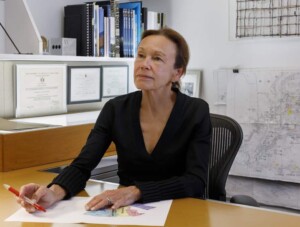
Signe Nielsen has been practicing as a landscape architect and urban designer in New York since 1978. Her body of work has renewed the environmental integrity and transformed the quality of spaces for those who live, work and play in the urban realm. She believes in using design as a vehicle for advocacy, to promote discourse on social equity and community resilience. She has served on multiple panels to effect positive change. A Fellow of the ASLA, she is the recipient of over 100 national and local design awards for public open space projects and is published extensively in national and international publications. Ms. Nielsen is a Professor of Urban Design and Landscape Architecture at Pratt Institute in both the Graduate and Undergraduate Schools of Architecture and is the former President for the Public Design Commission of the City of New York. Born in Paris, Ms. Nielsen holds degrees in Urban Planning from Smith College, in Landscape Architecture from City College of New York, and in Construction Management from Pratt Institute.
Democracy and Urban Form
Event Description
This pair of events marks the release of the book Democracy and Urban Form , a copublication by Harvard Design Press and Sternberg Press, which brings together a series of six lectures that the sociologist Richard Sennett gave under the same name at the GSD in the fall of 1981. These lectures, which happened now more than 40 years ago, addressed a much different political climate. But Richard’s core insight into the connections between democracy and justice, matters of architecture and urban design, the growth of cities, cosmopolitanism, inclusion, free speech, and other related matters are just as relevant today.
On the evening of Wednesday, October 9, the political philosopher Michael Sandel will deliver a lecture that draws on themes from the new edition of his book Democracy’s Discontent . What accounts for the polarization that imperils democracy today, and what might be done about it? In this talk, Michael Sandel analyzes the forces that will decide the 2024 election and proposes a bold project of civic renewal to reimagine the economy and empower citizens as participants in a shared public life.
On Thursday, October 10, a panel including Richard Sennett, Diane Davis, Claire Zimmerman, Markus Miessen, and Miguel Robles-Durán, will reflect on Sandel’s talk, as well as on the state of democracy as it relates more specifically to architecture and the design and planning of cities and metropolitan regions.
Books will be available for sale on Wednesday, October 9, courtesy of Frugal Bookstore .
Event Overview
Wednesday, October 9, 6:30 p.m.
Piper Auditorium
“Democracy’s Discontent”
Michael Sandel
Thursday, October 10, 12:30 p.m.
Stubbins, Gund 112
Panel Discussion
Richard Sennett, Diane Davis, Claire Zimmerman, Markus Miessen, and Miguel Robles-Durán
Speakers
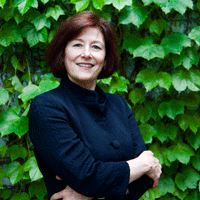
Diane E. Davis is the Charles Dyer Norton Professor of Regional Planning and Urbanism and former Chair of the Department of Urban Planning and Design at Harvard’s Graduate School of Design (GSD). She also is the director of the Mexican Cities Initiative at the GSD, and faculty chair of the committee on Mexico at the David Rockefeller Center for Latin American Studies at Harvard. Before moving to Harvard in 2012, Davis served as the head of the International Development Group in the Department of Urban Studies and Planning at MIT, where she also was Associate Dean of the School of Architecture and Planning. Trained as a sociologist with an interest in cities in Latin America (BA in Geography, Northwestern University; Ph.D. in sociology, UCLA) Davis’s research interests include the relations between urbanization and national development, urban governance, urban social movements, and informality, with a special emphasis on Mexico.
Books include Cities and Sovereignty: Identity Conflicts in the Urban Realm (Indiana University Press, 2011); Discipline and Development: Middle Classes and Prosperity in East Asia and Latin America (Cambridge University Press, 2004); Irregular Armed Forces and their Role in Politics and State Formation (Cambridge University Press, 2003); and Urban Leviathan: Mexico City in the Twentieth Century (Temple University Press 1994; Spanish translation 1999). Her recent research has focused on urban violence as well as spatial strategies to minimize risk and foster resilience in the face of these and other vulnerabilities.
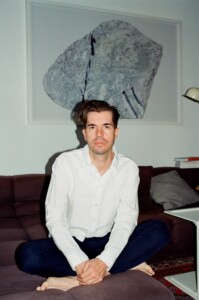
Markus Miessen is an architect and writer, and in 2021 was appointed Professor of Urban Regeneration at the University of Luxembourg, where he holds the Chair of the City of Esch. Miessen has previously taught at the AA, London, the Berlage Institute, Rotterdam, has been a Harvard GSD Fellow, and has held professorships at Städelschule, Frankfurt, and the University of Southern California, Los Angeles. He received his PhD from the Centre for Research Architecture at Goldsmiths, London, supervised by Eyal Weizman. His work revolves around questions of critical spatial practice, institution building, and spatial politics. As a spatial consultant, he currently works with the Munich Documentation Center for the History of National Socialism. He previously worked with the EU Commission, non-governmental organisations, the Republic of Slovenia during their presidency of the EU council, as well as many cultural and art institutions globally. Miessen is the author of “The Nightmare of Participation” and “Crossbenching”. He has edited volumes such as “Para-Platforms: on the spatial politics of right-wing populism”, “The Archive as a Productive Space of Conflict”, “Agonistic Assemblies, on the spatial politics of horizontality”, and is the co-editor of the book series “Critical Spatial Practice”. In Spring 2025, he will be the Dean’s Visiting Professor at Columbia GSAPP, NY.
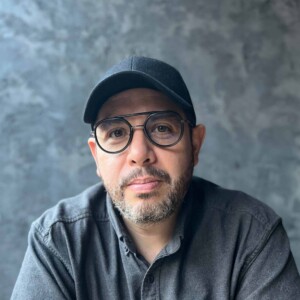
Miguel Robles-Durán, born in Mexico City, is an urbanist, theorist, designer, educator, and podcaster known for his transdisciplinary approach to urbanization. Combining urban political ecology, Marxist political economy, and critical human geography, he serves as a tenured Associate Professor of Urbanism at The New School / Parsons School of Design, where he directs the graduate urban programs. Before his 2010 appointment at The New School, Robles-Durán held academic positions at TU Delft, The Berlage Institute, and Zürich University of the Arts. Alongside David Harvey, he co-founded Urban Front, a transnational consultancy working with progressive governments on urban justice initiatives. He also co-founded Politics In Motion, an anti-capitalist media organization where he hosts the podcast “Cities After.”
In 2008, Robles-Durán co-founded Cohabitation Strategies, a cooperative that addressed socio-spatial inequities and urban development across Europe, North America, and South America. The cooperative’s work, spanning over a decade, dealt with housing, public infrastructure, and territorial development before merging with Urban Front in 2019. His global influence has been recognized through exhibitions at institutions like MoMA and La Biennale di Venezia. His upcoming book, *Cohabitation Strategies: Challenging Neoliberal Urbanization Between Crisis*, will be published in 2025.
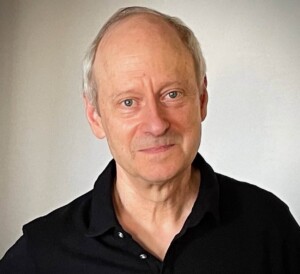
Michael Sandel teaches political philosophy at Harvard University. His books on justice, democracy, ethics, and markets have been translated into more than 30 languages. He has been described as “a rock star moralist” (Newsweek) and “the world’s most influential living philosopher.” (New Statesman).
Sandel’s recent book, The Tyranny of Merit: Can We Find the Common Good?, seeks a way beyond the polarized politics of our time. His previous books include Justice: What’s the Right Thing to Do? and What Money Can’t Buy: The Moral Limits of Markets. A new edition of his classic book Democracy’s Discontent
has been described as “essential–and ultimately hopeful–reading for all those who wonder if our democratic experiment will survive in the twenty-first century.”
Sandel’s free online course, “Justice,” has been viewed by tens of millions of people, including in China, where he was named the “most influential foreign figure of the year.” (China Newsweek). His BBC series, “The Global Philosopher,” explores the ethical issues lying behind the headlines with participants from around the world. His lectures have packed such venues as St. Paul’s Cathedral (London), the Sydney Opera House (Australia), the Delacorte Theater in New York’s Central Park, and an outdoor stadium in Seoul (S. Korea), where 14,000 came to hear him speak.
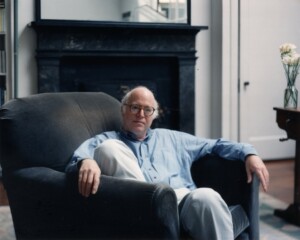
Richard Sennett currently serves as Chair of the UN Habitat Urban Initiatives Group. He is Senior Fellow at the Center on Capitalism and Society at Columbia University and Visiting Professor of Urban Studies at MIT. Previously, he founded the New York Institute for the Humanities, taught at New York University and the London School of Economics, and served as President of the American Council on Work. Over the course of the last five decades, he has written about social life in cities, changes in labour, and social theory. His books include The Hidden Injuries of Class, The Fall of Public Man, The Corrosion of Character, The Culture of the New Capitalism, The Craftsman, and Building and Dwelling. Among other awards, he has received the Hegel Prize, the Spinoza Prize, an honorary doctorate from Cambridge University, and the Centennial Medal from Harvard University.
Richard Sennett grew up in the Cabrini Green housing project in Chicago. He attended the Juilliard School in New York, where he worked with Claus Adam, cellist of the Juilliard Quartet. He then studied social relations at Harvard, working with David Riesman, and independently with Hannah Arendt.
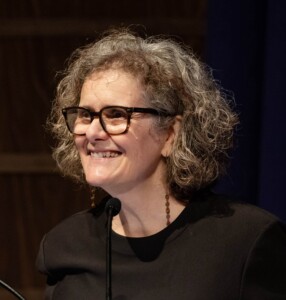
Claire Zimmerman currently directs the PhD Program in Architecture, Landscape, and Design at the Daniels Faculty of the University of Toronto. Her work focuses on modern architectural discourse and the built environment in past and present, in which historical questions help architects, historians, and students navigate present challenges. She has published three solo-authored books (in progress: Albert Kahn Inc.: Architecture Labor, Industry), four edited books and many articles, both long and short form. She studied at the University of Pennsylvania (B.A., 1985), Harvard University (MArch., 1990), and the CUNY Graduate Center (Ph.D., 2005). She directed Doctoral Studies in Architecture at the University of Michigan (2013-2019), where she co-founded the Equity in Architectural Education Consortium, a resource-sharing group of architectural schools with complementary needs. She has chaired the Committee on Equity in the Department of the History of Art and coordinated a community engagement project at UM, Black Washtenaw County (+$500,000). She serves or has served on thirty-nine dissertation committees, as primary advisor for eleven. She is the Associate Editor of the Journal of the Society of Architectural Historians.
Malkit Shoshan, Tatiana Bilbao, and Elke Krasny, “Building with Care: Feminist Perspectives on Design in Conflict”
Event Description
Our words have the power to cultivate our imagination and actions. By extension, they shape our world. Too often, our relationships with each other and the world are framed through the lens of war. Beyond the over 120 militarized conflicts globally, the word “war” is also used to capture our collective resources to mobilize radical changes – “war on poverty,” “war on crime,” “war on obesity,” “war on climate change,” and some still wage what is called a “war on women.” What if we remove the word “war” and look at our world with care? How can we center care not merely as an abstract idea but as a pragmatic process and ethos of collective well-being? Can we change our world through care and nurture?
This event will feature three short lectures by Malkit Shoshan, Elke Krasny, and Tatiana Bilbao, showcasing work that addresses systemic violence related to gender, race, and class disparity and exploring ways to integrate care into architecture and urbanism from a feminist perspective. The event is part of an ongoing conversation among the three, driven by questions about how to envision building a world aligned with anti-colonial and anti-capitalist viewpoints that remain marginalized in design.
Speakers
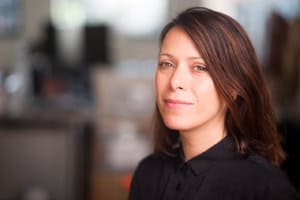
Malkit Shoshan is the 2024-2025 Senior Loeb Scholar at Harvard GSD and a 2024 Resident at The Rockefeller Foundation’s Bellagio Center. She is a designer, researcher, and writer, and founding director of the architecture think tank FAST (Foundation for Achieving Seamless Territory). FAST employs research, advocacy, design, and public art to explore the complex relationships between architecture, urban planning, and human rights.
In 2021, Shoshan was awarded the Silver Lion at the Venice Architecture Biennale for her collaborative project Border Ecologies and the Gaza Strip: Watermelon, Sardines, Crabs, Sand, and Sediment, which is also the subject of her forthcoming book with Amir Qudaih (Mack Books, 2024). Her award-winning books on spatial equity, peace, and conflict include BLUE: The Architecture of UN Peacekeeping Missions (Actar, 2023), Atlas of Conflict: Israel-Palestine (Uitgeverij 010, 2010), Village: One Land, Two Systems and Platform Paradise (Damiani Editore, 2014), Zoo, or the Letter Z, Just After Zionism (NAiM, 2012). Shoshan’s research and design work has been exhibited internationally and featured in prominent newspapers, magazines, and academic journals, including The New York Times, The Guardian, Haaretz, and Harvard Design Magazine.
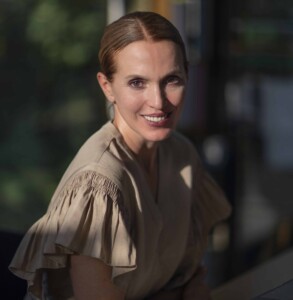
Tatiana Bilbao, architect, born in 1972, began her eponymous studio in 2004. Prior to this, she was an Advisor in the Ministry of Development and Housing for the Federal District of Mexico City. Bilbao holds a recurrent visiting teaching position at Yale University School of Architecture and has taught at Harvard University GSD, Columbia University GSAPP, Rice University, and Peter Behrens School of Arts at Dusseldorf in Germany, among others. Bilbao’s studio work intersects field research with the construction of an intellectual approach to focus on spaces that aim to become platforms for the possibility and enhancement of life across typologies and in different parts of the world. She has been recognized with several distinctions, including the Kunstpreis Berlin in 2012, the Global Award for Sustainable Architecture Prize by the LOCUS Foundation in 2014, the Marcus Prize Award in 2019, Tau Sigma Delta Gold Medal of the ACSA 2020, Honorary Fellow of the Royal Architectural Institute of Canada (RAIC) 2021, and the Richard Neutra Award in 2022, the architecture recognition of the FIL (International Book Fair) for the professional career of the year 2023, and a Doctorate Honoris Causa for Design from the Boston Architectural College in 2024.
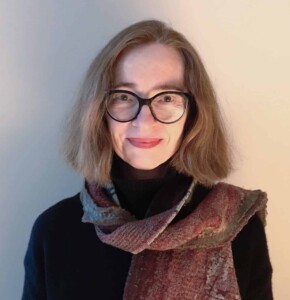
Elke Krasny, Professor at the Academy of Fine Arts Vienna, is a cultural theorist, curator, and author. Her work focuses on practices of care, transnational feminisms, and ecological and social justice in architecture, urbanism, and contemporary art. With Angelika Fitz, Krasny co-edited Critical Care: Architecture and Urbanism for a Broken Planet (MIT Press, 2019). In 2021, Krasny, together with Urska Jurman, initiated Ecologies of Care. Krasny, together with Sophie Lingg and Claudia Lomoschitz, edited Feminist Infrastructural Critique. Life-Affirming Practices against Capital.
Eric Höweler, “Clay: Pedagogy and Practice”
Event Description
Clay is a material origin point that precedes architecture. An abundant raw material, clay’s primary quality is its plasticity, worked through repetition and practice into a fired brick or a glazed pot. Similarly, the processes of architectural design, development, and detailing are essential operations in the spaces of both pedagogy and practice. Professor Eric Höweler will present recent projects that highlight the processes and predicaments of contemporary practice, from reimagining the site of Shanghai Expo Park to shaping spaces for democracy and materializing sites of memory.
Speaker
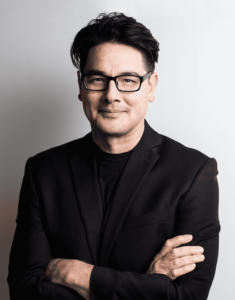
Eric Höweler, FAIA, LEED AP, is an architect, designer, and educator. He is co-founding partner of Höweler + Yoon and Professor of Architecture at the Harvard University Graduate School of Design, where he is the Program Director for the Masters of Architecture Program. Höweler’s design work and research focuses on building technology integration and material systems. His projects range from cultural buildings and mixed-use residential buildings, to public spaces and interactive environments. Notable completed projects include the MIT Museum at the Massachusetts Institute of Technology, the Memorial to Enslaved Laborers at the University of Virginia, and the Coolidge Corner Theatre Expansion in Brookline, Massachusetts. Höweler’s work has been exhibited widely, including at the Museum of Modern Art, the Smithsonian Cooper Hewitt National Design Museum in New York City, and the Venice Biennale. He is the co-author of Expanded Practice (Princeton Architectural Press, 2009) and Verify In Field: Projects and Conversations Höweler + Yoon (Park Books, 2021), and author of the forthcoming book, Design for Construction: The Tectonic Imagination in Contemporary Architecture (Routledge, 2025).
GSD Comeback: Alumni & Friends Celebration 2024
Event Description
We’re thrilled to welcome GSD alumni and friends back to campus on Sept. 20-22, 2024. Reconnect with friends, faculty, and students, celebrate the achievements of our Alumni Award winners, take a mini class, and more. For more details, please see the event schedule .
This event is ticketed and open to all alumni and friends. Guests must be over the age of 21.
Visit the Comeback 2024 website’s Hotels & Restaurants and Beyond the GSD tabs to plan your trip to the GSD.
For any questions or to request accessibility accommodations, please contact [email protected].
Farshid Moussavi, “Architecture As an Instruction-Based Art”
Event Description
In Fall 2024, the Druker Design Gallery will host an exhibition of drawings used to coordinate the construction process, that is, drawings that reflect the nature of architecture as an “instruction-based” art.
Construction coordination drawings differ from the sketches, perspectives, diagrams, maquettes, and other images that architects use to convey their ideas for a building. Unlike the painter or the sculptor, the architect’s final act results not in a completed work of art but in a set of instructions that enable the work of art to be realized. In this sense, an architect’s work is closer to that of a conceptual artist.
These instructions are then implemented on a site that is usually exposed to the elements and to the dynamics of often several years that it takes for the many specialist builders, roofers, carpenters, plumbers, electricians, and decorators to complete the building. Meanwhile, the architect remains both legally and morally accountable for all that follows from or is attached to his or her instructions.
This event, moderated by Farshid Moussavi, will feature presentations by several practices whose drawings appear in the exhibition. In brief remarks, the designers will reflect on the drawings and the complex processes they represent.
A reception will follow in the Druker Design Gallery.
Curator
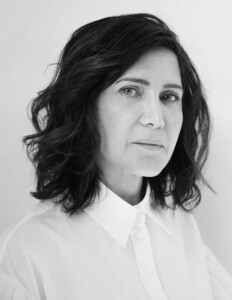
Farshid Moussavi is Professor in Practice in the Department of Architecture, Harvard University Graduate School of Design, and principal of Farshid Moussavi Architecture (FMA). In 2015, she was elected a Royal Academician. She trained at Harvard GSD, the Bartlett School of Architecture at University College London, and Dundee University. She was previously co-founder and co-principal of the London-based Foreign Office Architects (FOA), recognized as one of the world’s most creative design firms, integrating architecture, urban design, and landscape architecture in a wide range of projects internationally. Prior to this, she worked with the Renzo Piano Building Workshop in Genoa and the Office for Metropolitan Architecture in Rotterdam. Recognized as an outstanding and committed teacher who brings intellectual rigor to the discourse on architecture, she has been a visiting professor at UCLA, Columbia, Princeton, and several architecture schools in Europe; she was also the Kenzo Tange Visiting Design Critic at the GSD in Spring 2005. She taught for eight years at the Architectural Association in London and was the head of the Institute of Architecture at the Academy of Fine Arts in Vienna, where she taught from 2002 until 2005.
Moussavi is a columnist for The Architectural Review and author of The Function of Ornament (2006), The Function of Form (2009), and The Function of Style (2015), the latter of which is based on her research and teaching at Harvard.
Presenters
Iñaki Ábalos, Abalos+Sentkiewicz AS+, is founding principal of Ábalos+Sentkiewicz Architects with offices in Boston, Madrid, and Shanghai. He is professor of architectural design and director of the Laboratorio de Técnicas y Paisajes Contemporáneos (LTPC) at the Escuela Técnica Superior de Arquitectura de Madrid (ETSAM) and professor-in-residence at the Harvard Graduate School of Design.
Angela Pang, PangArchitect, is an Assistant Professor in Practice of Architecture at the GSD and the founder of PangArchitect. The firm’s recent work includes several university libraries in Hong Kong. PangArchitect has received numerous design awards including the Architect’s Newspaper Award for Best Library Design, the Green Building Award from the Hong Kong Green Building Council, and multiple recognitions from Dezeen Design Award, the World Architecture Festival Award, and the Hong Kong Institute of Architects.
Sean Canty, Studio Sean Canty, is an Assistant Professor of Architecture at Harvard University’s Graduate School of Design and the founder of Studio Sean Canty (SSC), an architecture practice based in Cambridge, MA. Canty is a founding principal of Office III (OIII), an experimental architectural collective. Selected as a finalist for the 2016 MoMA PS1 Young Architects competition, OIII has completed a Welcome Center for Governors Island and exhibited work at MoMA in New York.
Philip Schmerbeck, Herzog de Meuron, is the Studio Director overseeing the operations of Herzog & de Meuron’s studios in the US. He was the project manager in charge of Parrish Art Museum. He oversees the Powerhouse Arts project, a contemporary arts fabrication center recently completed in Brooklyn, and the Memphis Art Museum, which is currently under construction. He has gained specific knowledge working on a range of residential, cultural, and adaptive reuse projects.
Toyo Ito, Toyo Ito & Associates, Architects Tokyo-based architect Toyo Ito founded the studio Urban Robot, now Toyo Ito & Associates, Architects, in 1971. His projects include Sendai Mediatheque; Serpentine Gallery Pavilion 2002; Tama Art University Library (Hachioji Campus); ‘Minna no Mori’ Gifu Media Cosmos; National Taichung Theater; and Gaia – Nanyang Technological University. Ito received the 2013 Pritzker Architecture Prize. In 2011, he established a private architectural school, Ito Juku, which focuses on the future of cities and architecture.
Stéphanie Bru, BRUTHER Stéphanie Bru co-founded Bruther in Paris with Alexandre Theriot in 2007. Bruther received the Équerre d’Argent prize three times, the Dejean prize in 2018 from the Academy of Architecture, and more recently the Swiss Award. Stéphanie Bru is an associate professor at the Universität der Künste in Berlin and was the John C. Portman Design Critic at the GSD in spring 2022.
Christian KerezAfter an extensive career in architectural photography, Christian Kerez opened his own architectural office in Zürich, Switzerland in 1993. He is a Professor for Design and Architecture at the Swiss Federal Institute of Technology, Zürich. His built works include the apartment building on Forsterstrasse, the House With One Wall, and the Schoolhouse Leutschenbach. He is currently working on a large social housing project in São Paulo in addition to a high-rise in China.
Mack Scogin and Merrill Elam, Mack Scogin Merrill Elam Architects The two principals of Mack Scogin Merrill Elam Architects, have worked together in architecture for over forty years. The firm was founded in 1984 as Parker and Scogin. The principals have extensive experience in forming and leading multi-disciplined project teams. It is this experience combined with an unyielding commitment to meet clients’ needs with an architecture that is of the present-day that most distinguishes the firm’s work.
Chelina Odbert, “Situating Justice: Reflections on a Mission-Driven Practice”
Event Description
This presentation explores the ways in which design has a critical but often overlooked role in shaping inclusion, justice, and equity across the public realm. Because they engage in the intersections of environmental and urban systems, the design disciplines are well-equipped to address inequity, injustice, and challenges to inclusivity. The practice of design, however, is not. Relying on an outdated framework that pairs a paying client with a licensed design professional, the prevailing business model works within a system that perpetuates injustice by responding to those priorities set forth by those with access to capital.
From her days as a student at the GSD, Chelina’s goal has been to practice differently. Rather than just responding to briefs, she and her classmates started the Kounkuey Design Initiative (KDI) with the belief that another mode of practice was possible, one in which everyday people could identify challenges where they live—particularly at the intersection of environmental and social justice—and design practitioners could assemble the teams and processes to plan, design, and deliver projects.
Chelina’s talk will include a reflection on an unconventional journey to build a mission-driven practice: from high-end residential design, to the GSD, to the informal settlements of Kenya, and, eventually, to the rural and urban communities of Southern California. Chelina will explore the unique opportunities and challenges of a mission-driven practice. She will also share several flagship projects that, when taken together, begin to define what a just public realm could look like.
Speaker
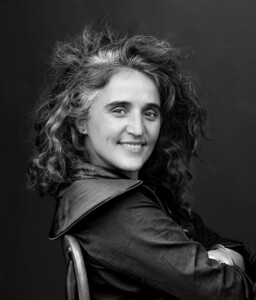
Chelina Odbert is the co-founder and executive director of Kounkuey Design Initiative (KDI), a non-profit that uses urban planning, landscape architecture, research, and community organizing to build a more just public realm. Straddling different disciplines, scales, and project types, her work is linked by a common purpose: to build community power and ensure that where you live does not determine how you live.
A leader in her field, Chelina has been recognized by the United Nations, the Aspen Institute, the Knight Foundation Fellows, and Ashoka Changemakers. Because of her ground-breaking work addressing the un-public nature of public space, she and her firm won a 2021 Emerging Voices Award from the Architectural League of New York. In 2022, KDI received the prestigious National Design Award in Landscape Architecture from the Smithsonian Cooper Hewitt Museum.
Chelina has held teaching appointments at Harvard Graduate School of Design, UCLA Luskin School of Public Affairs, and The Claremont Colleges. She lectures extensively about equitable communities and has written about sustainable development in a range of publications, including authoring The World Bank Handbook of Gender-Inclusive Urban Planning and Design and contributing to Just Urban Design, Designing Peace, and Now Urbanism.
Chelina earned a Master of Urban Planning degree from Harvard Graduate School of Design and a Bachelor of Arts with High Honors from Claremont McKenna College.
